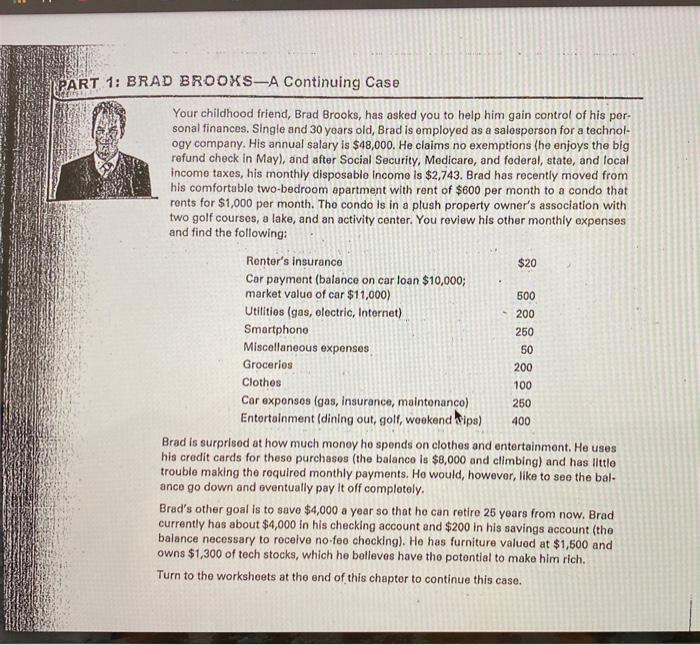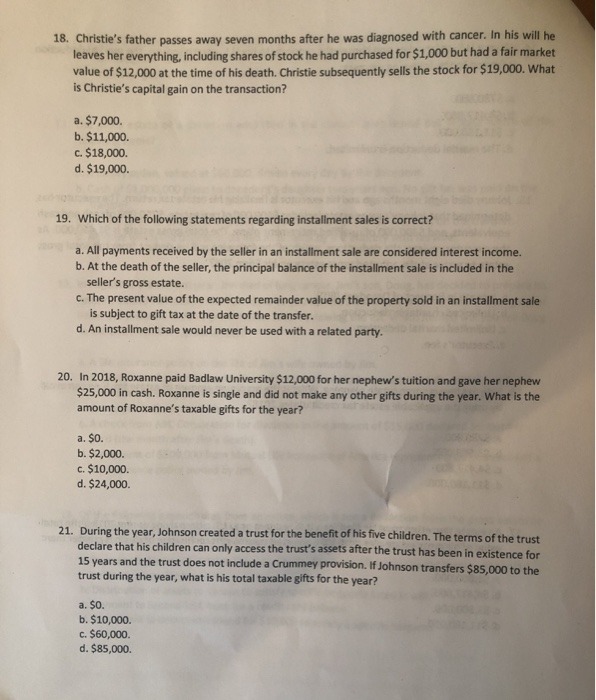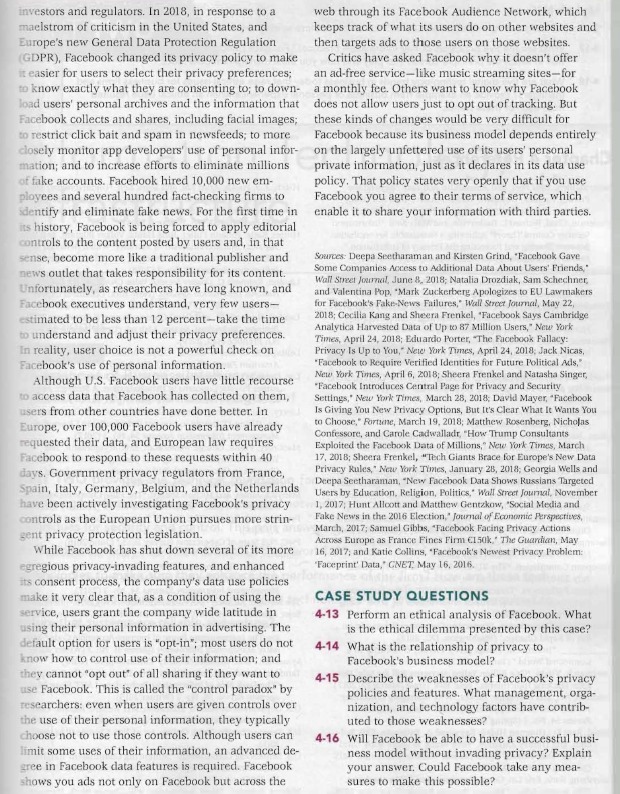
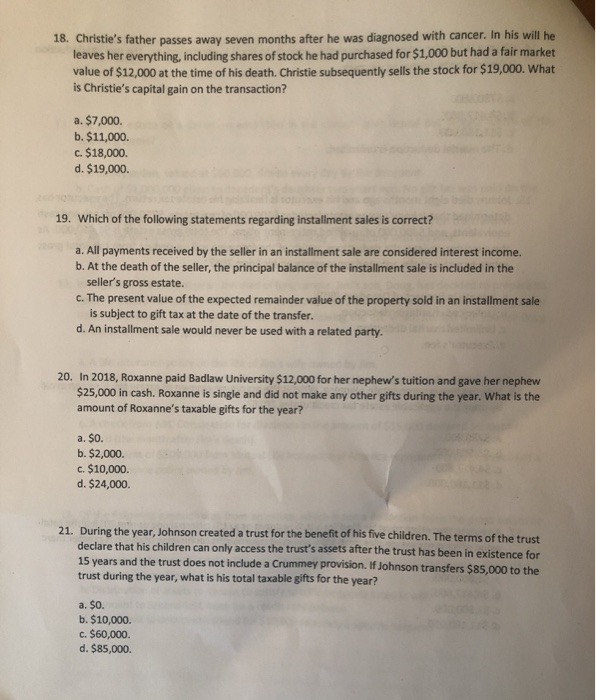
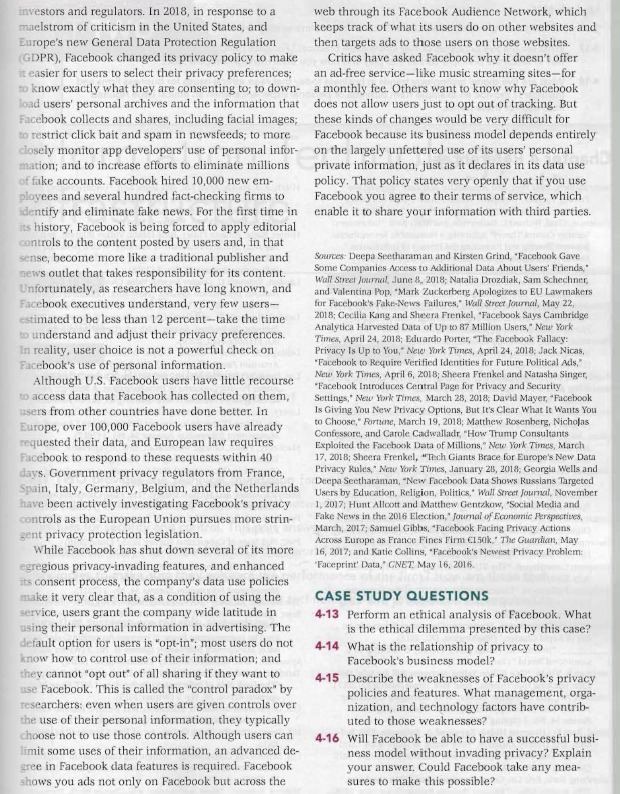
Answer the following questions.
PART 1: BRAD BROOKS-A Continuing Case Your childhood friend, Brad Brooks, has asked you to help him gain control of his per- sonal finances. Single and 30 years old, Brad is employed as a salesperson for a technol- ogy company. His annual salary is $48,000. He claims no exemptions (he enjoys the big refund check in May), and after Social Security, Medicare, and federal, state, and local income taxes, his monthly disposable Income Is $2,743. Brad has recently moved from his comfortable two-bedroom apartment with rent of $600 per month to a condo that rents for $1,000 per month. The condo is in a plush property owner's association with two golf courses, a lake, and an activity center. You review his other monthly expenses and find the following: Renter's insurance $20 Car payment (balance on car loan $10,000; market value of car $11,000) 500 Utilities (gas, electric, Internet) 200 Smartphone 250 Miscellaneous expenses 50 Groceries 200 Clothes 100 Car expenses (gas, insurance, maintenance) 260 Entertainment (dining out, golf, weekend vips) 400 Brad is surprised at how much money he spends on clothes and entertainment. He uses his credit cards for these purchases (the balance is $8,000 and climbing) and has little trouble making the required monthly payments. He would, however, like to see the bal- ance go down and eventually pay It off completely. Brad's other goal is to save $4,000 a year so that he can retire 25 years from now. Brad currently has about $4,000 In his checking account and $200 in his savings account (the balance necessary to receive no-fee checking). He has furniture valued at $1,500 and owns $1,300 of tech stocks, which he believes have the potential to make him rich. Turn to the worksheets at the end of this chapter to continue this case.18. Christie's father passes away seven months after he was diagnosed with cancer. In his will he leaves her everything, including shares of stock he had purchased for $1,000 but had a fair market value of $12,000 at the time of his death. Christie subsequently sells the stock for $19,000. What is Christie's capital gain on the transaction? a. $7,000. b. $11,000. C. $18,000. d. $19,000. 19. Which of the following statements regarding installment sales is correct? a. All payments received by the seller in an installment sale are considered interest income. b. At the death of the seller, the principal balance of the installment sale is included in the seller's gross estate. c. The present value of the expected remainder value of the property sold in an installment sale is subject to gift tax at the date of the transfer. d. An installment sale would never be used with a related party. 20. In 2018, Roxanne paid Badlaw University $12,000 for her nephew's tuition and gave her nephew $25,000 in cash. Roxanne is single and did not make any other gifts during the year. What is the amount of Roxanne's taxable gifts for the year? a. SO. b. $2,000. c. $10,000. d. $24,000. 21. During the year, Johnson created a trust for the benefit of his five children. The terms of the trust declare that his children can only access the trust's assets after the trust has been in existence for 15 years and the trust does not include a Crummey provision. If Johnson transfers $85,000 to the trust during the year, what is his total taxable gifts for the year? a. 50. b. $10,000. c. $60,000. d. $85,000.investors and regulators. In 2018, in response to a web through its Facebook Audience Network, which maelstrom of criticism in the United States, and keeps track of what its users do on other websites and Europe's new General Data Protection Regulation then targets ads to those users on those websites. (GDPR), Facebook changed its privacy policy to make Critics have asked Facebook why it doesn't offer it easier for users to select their privacy preferences; an ad-free service-like music streaming sites-for to know exactly what they are consenting to; to down- a monthly fee. Others want to know why Facebook load users' personal archives and the information that does not allow users just to opt out of tracking, But Facebook collects and shares, including facial images; these kinds of changes would be very difficult for to restrict click bait and spam in newsfeeds; to more Facebook because its business model depends entirely closely monitor app developers' use of personal infor- on the largely unfettered use of its users' personal mation; and to increase efforts to eliminate millions private information, just as it declares in its data use of fake accounts. Facebook hired 10,000 new em- policy. That policy states very openly that if you use ployees and several hundred fact-checking firms to Facebook you agree to their terms of service, which identify and eliminate fake news. For the first time in enable it to share your information with third parties. its history, Facebook is being forced to apply editorial controls to the content posted by users and, in that sense, become more like a traditional publisher and Sources: Deepa Seetharaman and Kirsten Grind, "Facebook Gave news outlet that takes responsibility for its content. Some Companies Access to Additional Data About Users' Friends," Wall Street Journal, June 8. 2018; Natalia Drozdiak, Sam Schechner, Unfortunately, as researchers have long known, and and Valentina Pop, "Mark Zuckerberg Apologizes to EU Lawmakers Facebook executives understand, very few users- for Facebook's Fake-News Failures," Wall Street Journal, May 22, estimated to be less than 12 percent-take the time 2018; Cecilia Kang and Sheera Frenkel, "Facebook Says Cambridge to understand and adjust their privacy preferences. Analytica Harvested Data of Up to 87 Million Users, " New York Times, April 24, 2018; Eduardo Porter, "The Facebook Fallacy: In reality, user choice is not a powerful check on Privacy Is Up to You," New York Times, April 24, 2018; Jack Nicas, Facebook's use of personal information. Facebook to Require Verified Identities for Future Political Ads," Although U.S. Facebook users have little recourse New York Times, April 6, 2018: Sheera Frenkel and Natasha Singer, Facebook Introduces Central Page for Privacy and Security to access data that Facebook has collected on them, Settings," New York Times, March 28, 2018: David Mayer, "Facebook users from other countries have done better. In Is Giving You New Privacy Options, But It's Clear What It Wants You Europe, over 100,000 Facebook users have already to Choose, " Fortune, March 19, 2018; Matthew Rosenberg, Nicholas Confessore, and Carole Cadwalladr, "How Trump Consultants requested their data, and European law requires Exploited the Facebook Data of Millions," New York Times, March Facebook to respond to these requests within 40 17, 201 8; Sheera Frenkel, "Tech Giants Brace for Europe's New Data days. Government privacy regulators from France, Privacy Rules, " New York Times, January 28, 2018: Georgia Wells and Spain, Italy, Germany, Belgium, and the Netherlands Deepa Seetharamian, "New Facebook Data Shows Russians Targeted Users by Education, Religion, Politics," Wall Street Journal, November have been actively investigating Facebook's privacy 1, 2017; Hunt Allcott and Matthew Gertzkow, "Social Media and controls as the European Union pursues more strin- Fake News in the 2016 Election, " Journal of Economic Perspectives, gent privacy protection legislation. March, 2017; Samuel Gibbs, "Facebook Facing Privacy Actions Across Europe as France Fines Firm (150k.' The Guardian, May While Facebook has shut down several of its more 16, 2017; and Katie Collins, "Facebook's Newest Privacy Problem: egregious privacy-invading features, and enhanced Faceprint' Data," GNET. May 16. 2016. its consent process, the company's data use policies make it very clear that, as a condition of using the CASE STUDY QUESTIONS service, users grant the company wide latitude in 4-13 Perform an ethical analysis of Facebook, What using their personal information in advertising. The is the ethical dilemma presented by this case? default option for users is "opt-in"; most users do not 4-14 What is the relationship of privacy to know how to control use of their information; and Facebook's business model? they cannot "opt out" of all sharing if they want to 4-15 Describe the weaknesses of Facebook's privacy use Facebook. This is called the "control paradox" by policies and features. What management, orga- researchers: even when users are given controls over nization, and technology factors have contrib the use of their personal information, they typically uted to those weaknesses? choose not to use those controls. Although users can 4-16 will Facebook be able to have a successful busi- limit some uses of their information, an advanced de- ness model without invading privacy? Explain gree in Facebook data features is required. Facebook your answer. Could Facebook take any mea- shows you ads not only on Facebook but across the sures to make this possible



